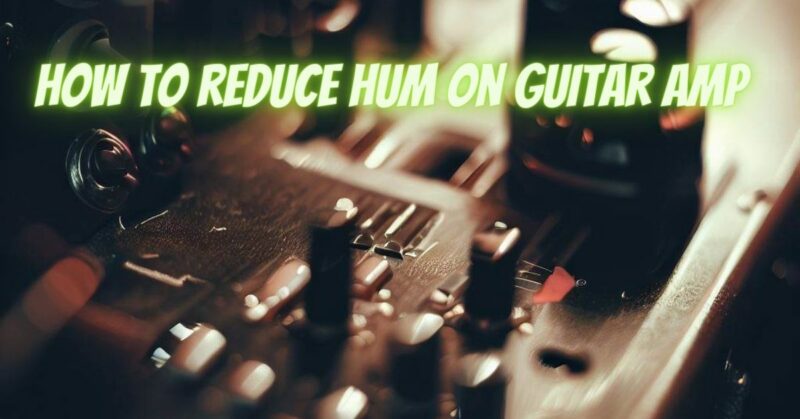Guitar amp hum can be an irritating and distracting issue that affects the overall sound quality and playing experience. Whether you are using a tube amp or a solid-state amp, hum can be caused by various factors, including grounding issues, electromagnetic interference, and poor cable connections. Thankfully, there are several steps you can take to minimize and reduce hum on your guitar amp. In this article, we will explore some practical tips to silence the buzz and achieve a clean and noise-free performance.
- Check Grounding and Power Source
One of the most common causes of guitar amp hum is improper grounding or ground loops. Ensure that your amp is plugged into a grounded power outlet using a high-quality power cable. Avoid using cheap, ungrounded power strips or extension cords. If you suspect a ground loop, try plugging your amp and other audio devices into the same power strip or outlet to eliminate the loop.
- Minimize Electromagnetic Interference (EMI)
Keep your guitar amp away from sources of electromagnetic interference, such as computers, fluorescent lights, smartphones, and Wi-Fi routers. These electronic devices can introduce unwanted electrical signals into your amp’s circuitry, causing hum. Positioning your amp in a different location can help reduce EMI.
- Use Shielded Cables and High-Quality Connections
Ensure that you are using shielded instrument cables between your guitar, pedals, and amp. Shielded cables help reduce interference from other electrical sources. Additionally, check all connections for any signs of damage or corrosion. Clean and secure all cable connections to maintain a clean signal path.
- Consider a Hum Eliminator or Ground Loop Isolator
If you are still experiencing hum despite taking the above steps, consider using a hum eliminator or a ground loop isolator. These devices are specifically designed to remove or reduce hum caused by ground loops and interference. They can be inserted between your guitar and amp or within your effects loop to isolate the ground and break the loop.
- Use a Power Conditioner
A power conditioner can help filter and stabilize the electrical power supply to your amp, reducing the impact of power-related issues on the hum. Power conditioners can filter out noise and provide consistent power to your amp, resulting in a cleaner sound.
- Investigate Tube Amp Issues
If you are using a tube amp, hum can sometimes be caused by faulty tubes. Try swapping out the tubes one at a time to see if the hum changes. If the hum persists, it might be time to have your amp checked by a qualified technician for any other tube amp-specific issues.
Reducing hum on your guitar amp is achievable with some careful troubleshooting and attention to detail. By checking grounding, minimizing electromagnetic interference, using quality shielded cables, and considering additional devices like hum eliminators or power conditioners, you can effectively silence the buzz and enjoy a clean and noise-free playing experience. If you are unsure about any technical aspects, don’t hesitate to seek the assistance of a qualified technician or guitar amplifier expert to ensure your amp is in top condition and performing at its best. With these measures in place, you can focus on making music without the distraction of unwanted hum and achieve the tones you desire.


